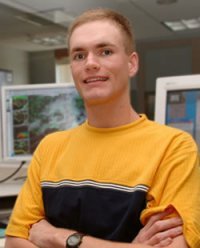Heather Archambault :: Lead Forecaster
 Heather Archambault is a Ph.D. student in the Department of Atmospheric and Environmental Sciences at the University at Albany, where she is coadvised by Lance Bosart, a PREDICT Principal Investigator, and Daniel Keyser. Heather's research interests lie in the area of synoptic-dynamic meteorology. She is particularly interested in midlatitude large-scale flow reconfigurations and their link to tropical and extratropical cyclone behavior and high-impact weather. In August 2008, Heather participated as a forecaster for the field project T-PARC, and is looking forward to taking on the role of lead forecaster during the final two weeks of PREDICT in September.
Heather Archambault is a Ph.D. student in the Department of Atmospheric and Environmental Sciences at the University at Albany, where she is coadvised by Lance Bosart, a PREDICT Principal Investigator, and Daniel Keyser. Heather's research interests lie in the area of synoptic-dynamic meteorology. She is particularly interested in midlatitude large-scale flow reconfigurations and their link to tropical and extratropical cyclone behavior and high-impact weather. In August 2008, Heather participated as a forecaster for the field project T-PARC, and is looking forward to taking on the role of lead forecaster during the final two weeks of PREDICT in September.
Jason Dunion :: Lead Forecaster
 Jason is with the University of Miami-NOAA/AOML/Hurricane Research Division and will be acting as a lead forecaster for PREDICT during the early phase of the deployment. He'll also be wearing his NOAA hat during that time by helping draw up and coordinate some of the NOAA P-3 and G-IV aircraft missions.
Jason is with the University of Miami-NOAA/AOML/Hurricane Research Division and will be acting as a lead forecaster for PREDICT during the early phase of the deployment. He'll also be wearing his NOAA hat during that time by helping draw up and coordinate some of the NOAA P-3 and G-IV aircraft missions.
He is a social worker turned meteorologist and has been working with the Hurricane Research Division in Miami for just over 10 years. He graduated from the University of Wisconsin-Madison in 1999 and specializes in satellite meteorology and research of tropical cyclones, Saharan dust storms, and climatology of the tropical Atlantic atmosphere. He's acted as Director of NOAA's annual hurricane field program, has been lead project scientist on several NOAA tropical cyclone aircraft research missions, and coordinate NOAA HRD's tropical forecast discussions throughout the season. Jason's been lucky enough to have flown on more than 45 hurricane hunter missions since joining HRD. He is definitely looking forward to the opportunity to work with the PREDICT scientists and hopes to help foster NOAA-NSF collaborations in the field.
Clark Evans :: Forecaster
 Clark is a postdoctoral fellow at NCAR through the Advanced Study Program and housed within the Mesoscale and Microscale Meteorology (MMM) division. He received his Ph.D. in meteorology from Florida State University in 2009 and specializes in the extratropical transition of tropical cyclones and the evolution of tropical cyclone-like vortices over land. Clark is a lifelong tropical weather nut, making him particularly excited about his participation as a forecaster during PREDICT. He'll be stationed in St. Croix during the last half of September, forecasting primarily alongside Heather Archambault and Brian Tang as the project draws to a conclusion.
Clark is a postdoctoral fellow at NCAR through the Advanced Study Program and housed within the Mesoscale and Microscale Meteorology (MMM) division. He received his Ph.D. in meteorology from Florida State University in 2009 and specializes in the extratropical transition of tropical cyclones and the evolution of tropical cyclone-like vortices over land. Clark is a lifelong tropical weather nut, making him particularly excited about his participation as a forecaster during PREDICT. He'll be stationed in St. Croix during the last half of September, forecasting primarily alongside Heather Archambault and Brian Tang as the project draws to a conclusion.
Michael Riemer :: Forecaster
 Dr. Michael Riemer is an NRC post doctoral researcher in the Department of Meteorology at the Naval Postgraduate School. His research interests span dynamic meteorology, synoptic meteorology, geophysical fluid dynamics, geophysical turbulence, theoretical, experimental, and computational fluid dynamics, and applied mathematics.
Dr. Michael Riemer is an NRC post doctoral researcher in the Department of Meteorology at the Naval Postgraduate School. His research interests span dynamic meteorology, synoptic meteorology, geophysical fluid dynamics, geophysical turbulence, theoretical, experimental, and computational fluid dynamics, and applied mathematics.
Brian Tang :: Forecaster; NCAR's Mesoscale and Microscale Meteorology division
In collaboration with other forecasters, Brian's job will be to give an overview of the synoptic analysis and forecast potential tropical disturbances that the PREDICT PIs may wish to investigate. He will be stationed in St. Croix during the last 12 days of September.
Brian has been fascinated by weather since a young age. In particular, his interest in hurricanes stemmed from following Hurricane Andrew in 1992. He received a Ph.D. in atmospheric science from the Massachusetts Institute of Technology in 2010. Brian's dissertation work looked at how vertical wind shear affects hurricane intensity through "ventilation," or the injection of dry air into the inner core of hurricanes. Some of the goals of PREDICT are natural extensions to my dissertation work since ventilation is also hypothesized to stifle tropical cyclogenesis. Specifically, he is interested in how ventilation affects the entropy or moist static energy budget of the critical layer and other ways in which vertical wind shear may affect genesis pathways.
Chris Velden :: Principal Investigator & Lead Forecaster
 Chris is one of the Principle Investigators for PREDICT, with a focus on how the mid-to-upper level environment may play a role in the Tropical Cyclone genesis process. His team at Cooperative Institute for Meteorological Satellite Studies (CIMSS) will be responsible for the satellite data and products support of PREDICT. He is also one of the lead forecasters, and will be stationed in St. Croix for about 3 weeks during the PREDICT deployment.
Chris is one of the Principle Investigators for PREDICT, with a focus on how the mid-to-upper level environment may play a role in the Tropical Cyclone genesis process. His team at Cooperative Institute for Meteorological Satellite Studies (CIMSS) will be responsible for the satellite data and products support of PREDICT. He is also one of the lead forecasters, and will be stationed in St. Croix for about 3 weeks during the PREDICT deployment.
CIMSS is a NOAA National Environmental Satellite, Data, and Information Service (NESDIS) cooperative institute, collocated at the University of Wisconsin. They specialize in satellite data processing, algorithm development and science applications. Within CIMSS, they have a Tropical Cyclones group, of which he is the team leader. Several members of his group will be participating in PREDICT.
The PREDICT science steering team asked him to join this project as a collaborating PI, and to lend his satellite data/products expertise to the observational toolbox that they will have available for detailed analyses of Tropical Cyclone genesis. He was intrigued by this offer, as the process of Tropical Cyclone genesis remains as one of the unanswered mysteries of the tropics. While the primary focus of the project hypotheses are on describing the role of the lower-tropospheric pouch and critical layer, his interests will be to explore the possible role of the upper-level environment during the pouch episodes. In particular, they hope to describe through high-resolution satellite-based analyses, augmented by high-level aircraft data, if a favorable upper-level environment can occur (low inertial instability, low shear, high moisture, outflow/mass flux vents, etc) independent of storm-induced flows, and in superposition with the pouch dynamics, to synergistically serve as an optimal set-up for genesis to happen.
Zhuo Wang :: Principal Investigator & Forecaster

Zhuo is an assistant professor at the University of Illinois at Urbana-Champaign. Her research focuses on tropical cyclone formation, in particular, tropical cyclone formation from tropical easterly waves and the multi-scale interaction involved in tropical cyclone formation. Zhuo collaborated with Dunkerton and Montgomery and proposed the marsupial paradigm, which is one of the hypotheses to be tested in the PREDICT field campaign. Zhuo has played a lead role in developing the "marsupial" forecast products. The marsupial products, which are based on the diagnosis of operational model forecasts in the marsupial framework, predict the thermodynamic evolution of the wave "pouch" and the genesis location within the precursor wave disturbance. The real-time marsupial products are expected to provide useful information for flight planning during the PREDICT field campaign.
Zhuo will be stationed in St. Croix for about ten days in mid-September, and take on the role of forecaster and flight scientist. One of her students will be in St Croix in late September to assist daily forecast and dropsonde deployment.
Data Set Documentation Guidelines
Data Submission Instructions
PREDICT HIAPER Documentation Summary
St Croix January Site Survey Report
Scientific Program Overview
Experimental Design Overview
Pre-Field Documentation
PREDICT Computer Data & Software Facility Staff
PREDICT Field Project Services Staff
PREDICT In-Situ Sensing Facility Staff
PREDICT Principal Investigators
Marsupial Tracking
IFEX-2010 Web Site at NOAA/AOML
IFEX proposed flight patterns
Caribbean Forecast Forum 2010
2010 National Hurricane Operations Plan





